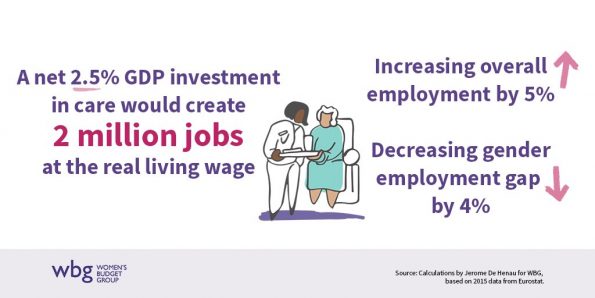Care, care, care to create jobs
 “Investment in care is economically and environmentally sound and would increase equality.”
“Investment in care is economically and environmentally sound and would increase equality.”
If the Prime Minister is serious about post-pandemic growth then, rather than ‘build, build, build’, he should invest in care to create jobs, the Women’s Budget Group said today.
Responding to the Prime Minister’s speech outlining how the government intends to ‘fuel’ the post-Covid economy, the Women’s Budget Group presented new research that shows that a net investment of around 2.5 per cent of GDP in child care and social care would:
Create over 2 million well-paid jobs;
Increase overall employment by over 5 percentage points; and
Decrease the gender employment gap by 4 percentage points.
Research by Dr Jerome De Henau, a socio-economist, with research interests in economics of gender, labour and household economics, fiscal and social policy, and Professor Susan Himmelweit for Women’s Budget Group found that investment in care has the potential to mitigate the worst employment effects of the coronavirus pandemic recession.
Investing in care would create 2.7 times as many jobs as the same investment in construction: 6.3 as many for women and 10 per cent more for men.
Increasing the numbers working in care to 10 per cent of the employed population, as in Sweden and Denmark, and giving all care workers a pay rise to the real living wage would create 2 million jobs, increasing overall employment rates by 5 percentage points and decreasing the gender employment gap by 4 percentage points.
It would mean that 50 per cent more could be recouped by the Treasury in direct and indirect tax revenue from investment in care than in construction.
And since investment in care is greener than in construction, it would produce 30 per cent less greenhouse gas emissions.
A care-led recovery would, basically, be a green-led recovery.
The Covid-19 pandemic has both exposed and exacerbated the UK’s crisis in care that left care homes fatally unprotected and unprepared.
At least 1.4 million older people have unmet care needs.
And even before the pandemic there were over 100,000 staff vacancies in social care and recent data shows 1 in 4 care workers were considering leaving their jobs due to poor working conditions.
And, currently, UK parents pay the highest childcare costs in Europe and the second highest in the world.
Investment in care is needed to stop the collapse of both the child and adult care sectors.
This research shows that such investment would also provide a far better economic stimulus than investment in construction.
It would also also promote gender equality, which the pandemic risks widening.
“In Scandinavian countries about 10 per cent of the employed population works in care,” Dr Jerome De Henau said.
“Using this as our model, we found that it would be possible to give all carers a well-deserved pay rise and still recoup 50 per cent more of the initial investment from direct and indirect tax revenue.
“Investment in child and adult social care creates more than double the number of jobs as the same investment in construction, giving it a greater impact on the overall employment rate.
“It also helps reduce the gender employment gap, which is at risk of widening due to Coronavirus.
“The Prime Ministers announcement today has responded to the public calls for spending on infrastructure to stimulate the economy, but this must include social infrastructure. And our research finds this would be more effective at generating employment.”
Professor Susan Himmelweit said: “The Prime Minister’s announcement today focussed on construction in order to stimulate the economy, and there is a no doubt that we need greener energy and transport as well as more social housing.
“However, our research finds that it is actually investment in social infrastructure, including in a reformed social care system, that is most effective at creating employment.
“Training, pay and working conditions in the care sector would need to be improved to attract new staff and transform our broken social care system.
“Investment in care under such conditions is an excellent way to stimulate employment, reduce the gender employment gap and counter the inevitable economic recession as the UK comes out of lockdown.”
And Dr Mary-Ann Stephenson, Director of the Women’s Budget Group, said: “Boris Johnson’s answer to the economic crisis caused by the coronavirus pandemic is to ‘build, build, build’. But this analysis shows that our focus needs to be on ‘care, care, care’.
“The care sector has been hardest hit by the tragic consequences of coronavirus.
“Many care homes and nurseries say that they are struggling to make ends meet and could close within the year.
“Since women do most unpaid care work, shortages in care provision will make it harder for them to return to work.
“Unlike in previous recessions, women, who are more likely to work in sectors like retail and hospitality, where redundancies seem inevitable due to social distancing requirements, may be the first to lose their jobs,” Dr Stephenson continued. “Yet, with the right training, many women have skills that are transferrable to care, where staff are badly needed.
“Employing workers in care has the added benefit of being better for the future of the planet than work in more environmentally unfriendly sectors.
“Investment in care is economically and environmentally sound and would increase equality.”
To read the full report, A Care-Led Recovery from Coronavirus, click here.















